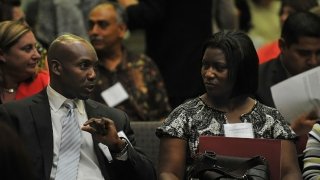Editor’s note: Darnell Fine is a student in the Doctor of Education in Educational Leadership program. He was recently selected to join the Association for Supervision and Curriculum Development’s Emerging Leaders Program. With this essay, the Blog is departing from its regular format to properly represent the author’s perspective.
Sometime in the eighteenth century, Samuel Manning (my third-great-grandfather) somehow escaped slavery, probably by running away. By the latter part of the century, he ended up marrying my 3rd-great-grandmother, Katie Beatrice of the Choctaw tribe, in Oklahoma. It is my fugitive ancestor finding love in maroon communities who remind me that escape is a form of resistance.
My very existence is a counterstory. My life and the history preceding it is a challenge to master narratives and unquestioned majoritarian stories. So when Dr. Leigh Patel’s words remind me that learning is an act of fugitivity, I not only know what this means, but I feel it in my soul.
My third-great-grandfather somehow escaped slavery, but I have no written records of this when he was outlawed from reading and writing. But there’s something definitively beautiful about me writing and living my own counterstory, no longer in secrecy. No longer hiding scraps of papers under the floorboards in the slave quarters and no longer silencing my voice; I am free because Samuel Manning was free.
Six generations removed, my place of work and my place of learning also feel like peculiar institutions. As a student in USC Rossier’s Doctor of Education in Educational Leadership program, I am given words to define who I am as both a Black leader and learner: a tempered radical (Reddick, Bukoski, & Smith, 2015) in two ivory towers.
I am not as radical as Samuel Manning to escape, but tempered enough to remain loyal to rather than leave institutions that are what Dr. Bettina Love deems spirit murdering. That is, institutions may not enact physical violence towards Black and Brown community members, but the racism we experience can still leave us with personal, psychological, and spiritual injuries. And despite these injuries, I remain.
In antebellum, my resistance would have been more passive than active; I would have broken tools, feigned sick, or slowed down the rhythm of my work before ever stealing myself away from the plantation.
But these are still acts of resistance nonetheless. So I embrace my tempered radicalism as a leader and a scholar and will use it to resist the status quo and effect change in my organizations.
In antebellum, my resistance would have been more passive than active; I would have broken tools, feigned sick, or slowed down the rhythm of my work before ever stealing myself away from the plantation.
But these are still acts of resistance nonetheless. So I embrace my tempered radicalism as a leader and a scholar and will use it to resist the status quo and effect change in my organizations.
Resistance Strategy 1
Just as my ancestors in bondage made small changes to the words in their hymns—encoding hidden messages about escaping freedom in their spirituals—I, too, will embrace the small, discrete ways to resist.
I will wear my headwrap on my own terms without calling attention to its radical history. I will slow the pace of my work when a sense of urgency is—according to scholar-activists Tema Okun and Keith Jones—being yielded as a tool of white supremacy culture. I will put up pictures of Ida and Assata—Marcus and Malcolm—above my desk. I will slip Black proverbs into the content of emails and code switch to Black English Vernacular in academic presentations.
Resistance Strategy 2
I remember my elders telling me that ‘playing the dozens’ was a ritualized game of insults rooted in slavery. As a means of survival, these were verbal sparring sessions between enslaved Africans so that my ancestors learned to keep their cool when their masters disparaged them. They sustained the figurative meaning of words and signifyin’ inherited from pre-colonial Africa. So I will find the language to respond to microaggressions:
“Where are you from?” From stolen land.
“I didn’t think you were the most qualified for the job.” I didn’t think you worked for HR.
Resistance Strategy 3
I would like to believe Black abolitionists and race traitors like John Brown assisted my third-great-grandfather to freedom. I want to imagine there was an alliance of conductors on the Underground Railroad who provided Samuel Manning cover at night. When the Fugitive Slave Act deemed him a thief for stealing his own freedom, my belief in humanity leads me to hope there were accomplices to his crime.
And today, still, I believe in alliance building. So, I will work to develop a collective framing of justice and guide diverse stakeholders to see that the primary interest converging with these issues is simply to re-humanize themselves.
I am still writing my counterstory as a Black educational leader and scholar seeking to disrupt the status quo. I believe in change for myself and for others.
And so, even if my radical stance is “tempered” and I have no desire to escape what several scholars have deemed academic plantations (Matias, 2015; Tuitt, Squire, & Williams, 2018), I will still push against the structures and the strictures of the status quo, chiseling away at the foundation of the institution.




